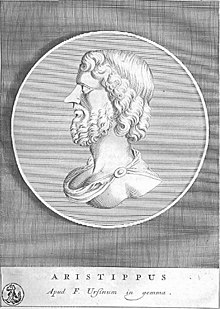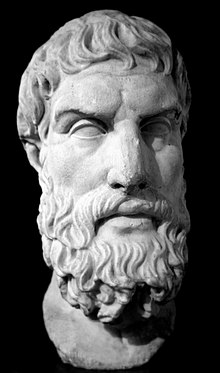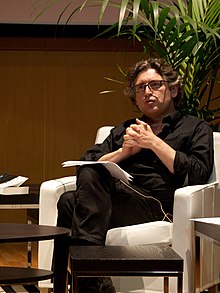Virtue ethics (or aretaic ethics /ˌærəˈteɪ.ɪk/, from Greek ἀρετή (arete)) are normative ethical theories which emphasize virtues of mind and character. Virtue ethicists discuss the nature and definition of virtues and other related problems. For example, how are virtues acquired? How are they applied in various real life contexts? Are virtues rooted in a universal human nature or in a plurality of cultures?
Key concepts
The western tradition's key concepts derive from ancient Greek philosophy. These concepts include arete (excellence or virtue), phronesis (practical or moral wisdom), and eudaimonia (flourishing).A virtue is generally agreed to be a character trait, such as a habitual action or settled sentiment.[2] Specifically, a virtue is a positive trait that makes its possessor a good human being. A virtue is thus to be distinguished from single actions or feelings. Rosalind Hursthouse says:
A virtue such as honesty or generosity is not just a tendency to do what is honest or generous, nor is it to be helpfully specified as a “desirable” or “morally valuable” character trait. It is, indeed a character trait—that is, a disposition which is well entrenched in its possessor, something that, as we say “goes all the way down”, unlike a habit such as being a tea-drinker—but the disposition in question, far from being a single track disposition to do honest actions, or even honest actions for certain reasons, is multi-track. It is concerned with many other actions as well, with emotions and emotional reactions, choices, values, desires, perceptions, attitudes, interests, expectations and sensibilities. To possess a virtue is to be a certain sort of person with a certain complex mindset. (Hence the extreme recklessness of attributing a virtue on the basis of a single action.)Practical wisdom is an acquired trait that enables its possessor to identify the thing to do in any given situation.[3] Unlike theoretical wisdom, practical reason results in action or decision.[4] As John McDowell puts it, practical wisdom involves a "perceptual sensitivity" to what a situation requires.[5]
Eudaimonia (εὐδαιμονία) is a state variously translated from Greek as 'well-being', 'happiness', 'blessedness', and in the context of virtue ethics, 'human flourishing'.[6] Eudaimonia in this sense is not a subjective, but an objective, state. It characterizes the well-lived life. According to Aristotle, the most prominent exponent of eudaimonia in the Western philosophical tradition, "eudaimonia" is the proper goal of human life. It consists of exercising the characteristic human quality -- reason—as the soul's most proper and nourishing activity. In his Nicomachean Ethics, Aristotle, like Plato before him, argued that the pursuit of eudaimonia is an "activity of the soul in accordance with perfect virtue",[7] which further could only properly be exercised in the characteristic human community—the polis or city-state.
Although, eudaimonia was first popularized by Aristotle, it now belongs to the tradition of virtue theories generally. For the virtue theorist, eudaimonia describes that state achieved by the person who lives the proper human life, an outcome that can be reached by practicing the virtues. A virtue is a habit or quality that allows the bearer to succeed at his, her, or its purpose. The virtue of a knife, for example, is sharpness; among the virtues of a racehorse is speed. Thus, to identify the virtues for human beings, one must have an account of what the human purpose is.
History of virtue
Like much of the Western tradition, virtue theory seems to have originated in ancient Greek philosophy.Virtue ethics began with Socrates, and was subsequently developed further by [8][9][10] Plato, Aristotle, and the Stoics. Virtue ethics refers to a collection of normative ethical philosophies that place an emphasis on being rather than doing. Another way to say this is that in virtue ethics, morality stems from the identity and/or character of the individual, rather than being a reflection of the actions (or consequences thereof) of the individual. Today, there is debate among various adherents of virtue ethics concerning what specific virtues are morally praiseworthy. However, most theorists agree that morality comes as a result of intrinsic virtues. Intrinsic virtues are the common link that unites the disparate normative philosophies into the field known as virtue ethics. Plato and Aristotle's treatment of virtues are not the same. Plato believes virtue is effectively an end to be sought, for which a friend might be a useful means. Aristotle states that the virtues function more as means to safeguard human relations, particularly authentic friendship, without which one's quest for happiness is frustrated.
Discussion of what were known as the Four Cardinal Virtues – wisdom, justice, fortitude, and temperance – can be found in Plato's Republic. The virtues also figure prominently in Aristotle's moral theory (see below). Virtue theory was inserted into the study of history by moralistic historians such as Livy, Plutarch, and Tacitus. The Greek idea of the virtues was passed on in Roman philosophy through Cicero and later incorporated into Christian moral theology by St. Ambrose of Milan. During the scholastic period, the most comprehensive consideration of the virtues from a theological perspective was provided by St. Thomas Aquinas in his Summa Theologiae and his Commentaries on the Nicomachean Ethics.
Though the tradition receded into the background of European philosophical thought in these centuries, the term "virtue" remained current during this period, and in fact appears prominently in the tradition of classical republicanism or classical liberalism. This tradition was prominent in the intellectual life of 16th-century Italy, as well as 17th- and 18th-century Britain and America; indeed the term "virtue" appears frequently in the work of Niccolò Machiavelli, David Hume, the republicans of the English Civil War period, the 18th-century English Whigs, and the prominent figures among the Scottish Enlightenment and the American Founding Fathers.
Contemporary "aretaic turn"
Although some Enlightenment philosophers (e.g. Hume) continued to emphasise the virtues, with the ascendancy of utilitarianism and deontology, virtue theory moved to the margins of Western philosophy. The contemporary revival of virtue theory is frequently traced to the philosopher G. E. M. Anscombe's 1958 essay "Modern Moral Philosophy". Following this:- In the 1976 paper "The Schizophrenia of Modern Ethical Theories", Michael Stocker summarises the main aretaic criticisms of deontological and consequentialist ethics.[11]
- Philippa Foot, who published a collection of essays in 1978 entitled Virtues and Vices.
- Alasdair MacIntyre has made an effort to reconstruct a virtue-based theory in dialogue with the problems of modern and postmodern thought; his works include After Virtue and Three Rival Versions of Moral Enquiry.
- Paul Ricoeur has accorded an important place to Aristotelian teleological ethics in his hermeneutical phenomenology of the subject, most notably in his book Oneself as Another.
- Theologian Stanley Hauerwas has also found the language of virtue quite helpful in his own project.
- Rosalind Hursthouse has published On Virtue Ethics.
- Roger Crisp and Michael Slote have edited a collection of important essays titled Virtue Ethics.
- Martha Nussbaum and Amartya Sen have employed virtue theory in theorising the capability approach to international development.
- Julia Annas wrote The Morality of Happiness (1993).
- Lawrence C. Becker identified current virtue theory with Stoicism (or Modern Stoicism) in A New Stoicism. (1998).
Aretaic approaches to morality, epistemology, and jurisprudence have been the subject of intense debates. One criticism that is frequently made focuses on the problem of guidance; opponents, such as Robert Louden in his article "Some Vices of Virtue Ethics", question whether the idea of a virtuous moral actor, believer, or judge can provide the guidance necessary for action, belief formation, or the decision of legal disputes.
Lists of virtues
There are several different lists of particular virtues. Socrates argued that virtue is knowledge, which suggests that there is really only one virtue.[12] The Stoics concurred, claiming the four cardinal virtues were only aspects of true virtue. John McDowell is a recent defender of this conception. He argues that virtue is a "perceptual capacity" to identify how one ought to act, and that all particular virtues are merely "specialized sensitivities" to a range of reasons for acting.[13]Aristotle's list
Aristotle identifies approximately eighteen virtues that enable a person to perform their human function well.[14] He distinguished virtues pertaining to emotion and desire from those pertaining to the mind.[15] The first he calls "moral" virtues, and the second intellectual virtues (though both are "moral" in the modern sense of the word). Each moral virtue was a mean (see golden mean) between two corresponding vices, one of excess and one of deficiency. Each intellectual virtue is a mental skill or habit by which the mind arrives at truth, affirming what is or denying what is not.[16] In the Nicomachean Ethics he discusses about 11 moral virtues:
Moral Virtues
1. Courage in the face of fear
2. Temperance in the face of pleasure and pain
3. Liberality with wealth and possessions
4. Magnificence with great wealth and possessions
5. Magnanimity with great honors
6. Proper ambition with normal honors
7. Truthfulness with self-expression
8. Wittiness in conversation
9. Friendliness in social conduct
10. Modesty in the face of shame or shamelessness
11. Righteous indignation in the face of injury
Intellectual virtues
- Nous (intelligence), which apprehends fundamental truths (such as definitions, self-evident principles)
- Episteme (science), which is skill with inferential reasoning (such as proofs, syllogisms, demonstrations)
- Sophia (theoretical wisdom), which combines fundamental truths with valid, necessary inferences to reason well about unchanging truths.
- Gnome (good sense) -- passing judgment, "sympathetic understanding"
- Synesis (understanding) -- comprehending what others say, does not issue commands
- Phronesis (practical wisdom) -- knowledge of what to do, knowledge of changing truths, issues commands
- Techne (art, craftsmanship)
Criticisms
Some philosophers criticise virtue ethics as culturally relative. Since different people, cultures and societies often have different opinions on what constitutes a virtue, perhaps there is no one objectively right list.For example, regarding what are the most important virtues, Aristotle proposed the nine listed earlier (just above Historical origins): wisdom; prudence; justice; fortitude; courage; liberality; magnificence; magnanimity; temperance. In contrast, one modern-era philosopher proposed as the four cardinal virtues: ambition/humility; love; courage; and honesty.[18]
As another example, regarding virtues once supposedly applicable to women, many would have once considered a virtuous woman to be quiet, servile, and industrious. This conception of female virtue no longer holds true in many modern societies. Proponents of virtue theory sometimes respond to this objection by arguing that a central feature of a virtue is its universal applicability. In other words, any character trait defined as a virtue must reasonably be universally regarded as a virtue for all sentient beings. According to this view, it is inconsistent to claim for example servility as a female virtue, while at the same time not proposing it as a male one.
Other proponents of virtue theory, notably Alasdair MacIntyre, respond to this objection by arguing that any account of the virtues must indeed be generated out of the community in which those virtues are to be practiced: the very word "ethics" implies "ethos". That is to say that the virtues are, and necessarily must be, grounded in a particular time and place. What counts as virtue in 4th-century Athens would be a ludicrous guide to proper behavior in 21st-century Toronto, and vice versa. To take this view does not necessarily commit one to the argument that accounts of the virtues must therefore be static: moral activity—that is, attempts to contemplate and practice the virtues—can provide the cultural resources that allow people to change, albeit slowly, the ethos of their own societies. MacIntyre appears to take this position in his seminal work on virtue ethics, After Virtue. One might cite (though MacIntyre does not) the rapid emergence of abolitionist thought in the slave-holding societies of the 18th-century Atlantic world as an example of this sort of change: over a relatively short period of time, perhaps 1760 to 1800, in Britain, France, and British America, slave-holding, previously thought to be morally neutral or even virtuous, rapidly became seen as vicious among wide swathes of society. While the emergence of abolitionist thought derived from many sources, the work of David Brion Davis, among others[who?], has established that one source was the rapid, internal evolution of moral theory among certain sectors of these societies, notably the Quakers.
Another objection to virtue theory is that the school does not focus on what sorts of actions are morally permitted and which ones are not, but rather on what sort of qualities someone ought to foster in order to become a good person. In other words, while some virtue theorists may not condemn, for example, murder as an inherently immoral or impermissible sort of action, they may argue that someone who commits a murder is severely lacking in several important virtues, such as compassion and fairness. Still, antagonists of the theory often object that this particular feature of the theory makes virtue ethics useless as a universal norm of acceptable conduct suitable as a base for legislation. Some virtue theorists concede this point, but respond by opposing the very notion of legitimate legislative authority instead, effectively advocating some form of anarchism as the political ideal.[citation needed] Others argue that laws should be made by virtuous legislators. Still others argue that it is possible to base a judicial system on the moral notion of virtues rather than rules.
Some virtue theorists might respond to this overall objection with the notion of a "bad act" also being an act characteristic of vice[citation needed]. That is to say that those acts that do not aim at virtue, or stray from virtue, would constitute our conception of "bad behavior". Although not all virtue ethicists agree to this notion, this is one way the virtue ethicist can re-introduce the concept of the "morally impermissible". One could raise objection with Foot that she is committing an argument from ignorance by postulating that what is not virtuous is unvirtuous. In other words, just because an action or person 'lacks of evidence' for virtue does not, all else constant, imply that said action or person is unvirtuous.
Subsumed in deontology and utilitarianism
Martha Nussbaum has suggested that while virtue ethics is often considered to be anti-Enlightenment, "suspicious of theory and respectful of the wisdom embodied in local practices",[19] it is actually neither fundamentally distinct from, nor does it qualify as a rival approach to deontology and utilitarianism. She argues that philosophers from these two Enlightenment traditions often include theories of virtue. She pointed out that Kant's "Doctrine of Virtue" (in The Metaphysics of Morals) "covers most of the same topics as do classical Greek theories", "that he offers a general account of virtue, in terms of the strength of the will in overcoming wayward and selfish inclinations; that he offers detailed analyses of standard virtues such as courage and self-control, and of vices, such as avarice, mendacity, servility, and pride; that, although in general he portrays inclination as inimical to virtue, he also recognizes that sympathetic inclinations offer crucial support to virtue, and urges their deliberate cultivation."[19]Nussbaum also points to considerations of virtue by utilitarians such as Henry Sidgwick (The Methods of Ethics), Jeremy Bentham (The Principles of Morals and Legislation), and John Stuart Mill, who writes of moral development as part of an argument for the moral equality of women (The Subjection of Women). She argues that contemporary virtue ethicists such as Alasdair MacIntyre, Bernard Williams, Philippa Foot, and John McDowell have few points of agreement, and that the common core of their work does not represent a break from Kant.
Utopianism and pluralism
Robert Louden criticises virtue ethics on the basis that it promotes a form of unsustainable utopianism. Trying to come to a single set of virtues is immensely difficult in contemporary societies as, according to Louden, they contain "more ethnic, religious, and class groups than did the moral community which Aristotle theorized about" with each of these groups having "not only its own interests but its own set of virtues as well". Louden notes in passing that MacIntyre, a supporter of virtue-based ethics, has grappled with this in After Virtue but that ethics cannot dispense with building rules around acts and rely only on discussing the moral character of persons.[20]Topics in virtue ethics
Virtue ethics as a category
Virtue ethics can be contrasted to deontological ethics and consequentialist ethics by an examination of the other two (the three being together the most predominant contemporary normative ethical theories).Deontological ethics, sometimes referred to as duty ethics, places the emphasis on adhering to ethical principles or duties. How these duties are defined, however, is often a point of contention and debate in deontological ethics. One of the predominant rule schemes utilized by deontologists is the Divine Command Theory. Deontology also depends upon meta-ethical realism, in that it postulates the existence of moral absolutes that make an action moral, regardless of circumstances. For more information on deontological ethics refer to the work of Immanuel Kant.
The next predominant school of thought in normative ethics is consequentialism. While deontology places the emphasis on doing one's duty, which is established by some kind of moral imperative (in other words, the emphasis is on obedience to some higher moral absolute), consequentialism bases the morality of an action upon the consequences of the outcome. Instead of saying that one has a moral duty to abstain from murder, a consequentialist would say that we should abstain from murder because it causes undesirable effects. The main contention here is what outcomes should/can be identified as objectively desirable. The Greatest Happiness Principle of John Stuart Mill is one of the most commonly adopted criteria. Mill asserts that our determinant of the desirability of an action is the net amount of happiness it brings, the number of people it brings it to, and the duration of the happiness. He also tries to delineate classes of happiness, some being preferable to others, but there is a great deal of difficulty in classifying such concepts. For a more complete outline of the niceties of Mill's classification system see the page on utilitarianism or read Mill's works Utilitarianism, Defense of Utilitarianism, and On Liberty. Examining the meta-ethical theories of naturalism, upon which many consequentialist theories rely, may provide further clarification. Having looked at the other two normative ethical theories we come at last to virtue ethics.
As stated before, deontology focuses on adhering to ethical duties, while consequentialism focuses on the outcomes (consequences) of actions. Here virtue ethics differs in that the focus is instead upon being rather than doing. A virtue ethics philosopher will identify virtues, desirable characteristics, that the moral or virtuous person embodies. Possessing these virtues, in virtue ethics, is what makes one moral, and one's actions are a mere reflection of one's inner morality. To the virtue philosopher, action cannot be used as a demarcation of morality, because a virtue encompasses more than just a simple selection of action. Instead, it is about a way of being that would cause the person exhibiting the virtue to make a certain "virtuous" choice consistently in each situation. There is a great deal of disagreement within virtue ethics over what are virtues and what are not. There are also difficulties in identifying what is the "virtuous" action to take in all circumstances, and how to define a virtue.
Consequentialist and deontological theories often still employ the term 'virtue', but in a restricted sense, namely as a tendency or disposition to adhere to the system's principles or rules. These very different senses of what constitutes virtue, hidden behind the same word, are a potential source of confusion. This disagreement over the meaning of virtue points to a larger conflict between virtue theory and its philosophical rivals. A system of virtue theory is only intelligible if it is teleological: that is, if it includes an account of the purpose (telos) of human life, or in popular language, the meaning of life.[citation needed] Obviously, strong claims about the purpose of human life, or of what the good life for human beings is, will be highly controversial. Virtue theory's necessary commitment to a teleological account of human life thus puts the tradition in sharp tension with other dominant approaches to normative ethics, which, because they focus on actions, do not bear this burden.
Virtue and politics
Virtue theory emphasises Aristotle's belief in the polis as the acme of political organisation, and the role of the virtues in enabling human beings to flourish in that environment. Classical republicanism in contrast emphasises Tacitus' concern that power and luxury can corrupt individuals and destroy liberty, as Tacitus perceived in the transformation of the Roman Republic into the Roman Empire; virtue for classical republicans is a shield against this sort of corruption and a means to preserve the good life one has, rather than a means by which to achieve the good life one does not yet have. Another way to put the distinction between the two traditions is that virtue ethics relies on Aristotle's fundamental distinction between the human-being-as-he-is from the human-being-as-he-should-be, while classical republicanism relies on the Tacitean distinction of the human-being-as-he-is from the human-being-as-he-is-at-risk-of-becoming.[21]Applied virtue ethics
Virtue ethics has a number of contemporary applications.- Social and political philosophy
- Education
- Health care and medical ethics









